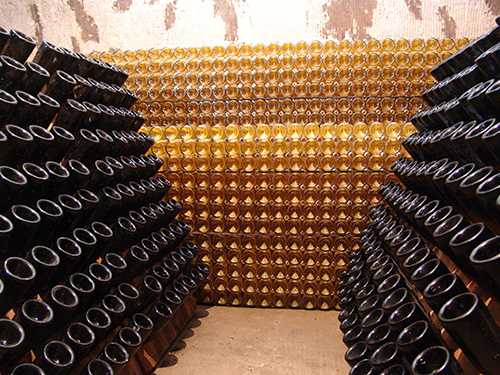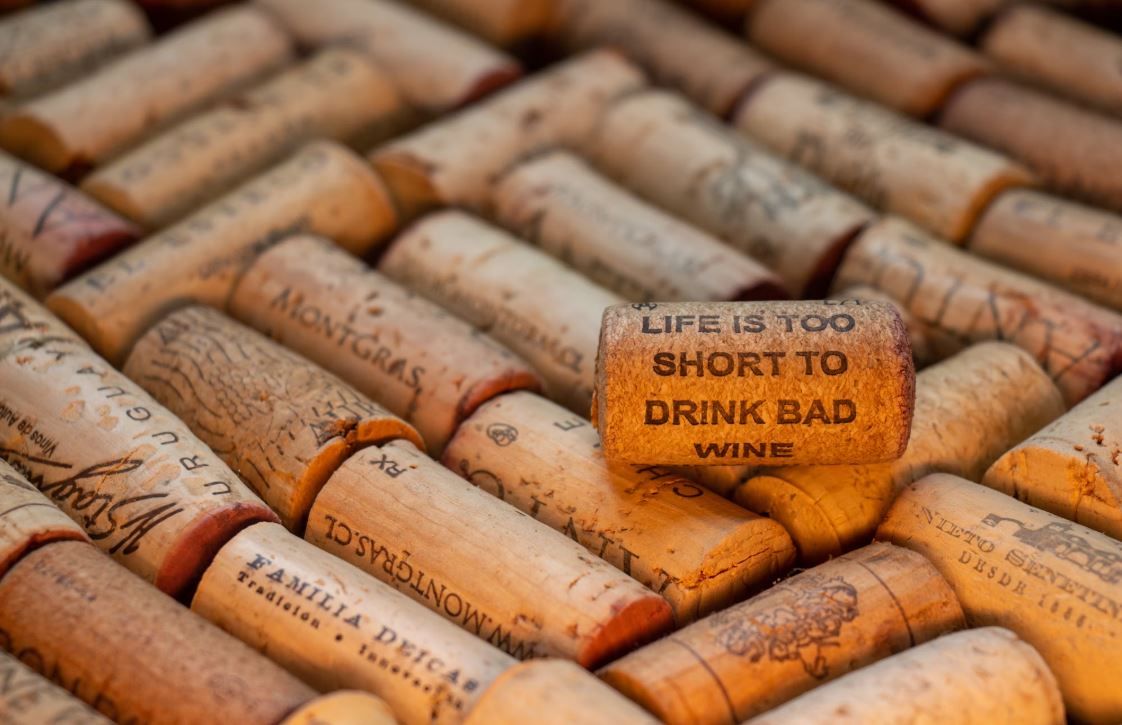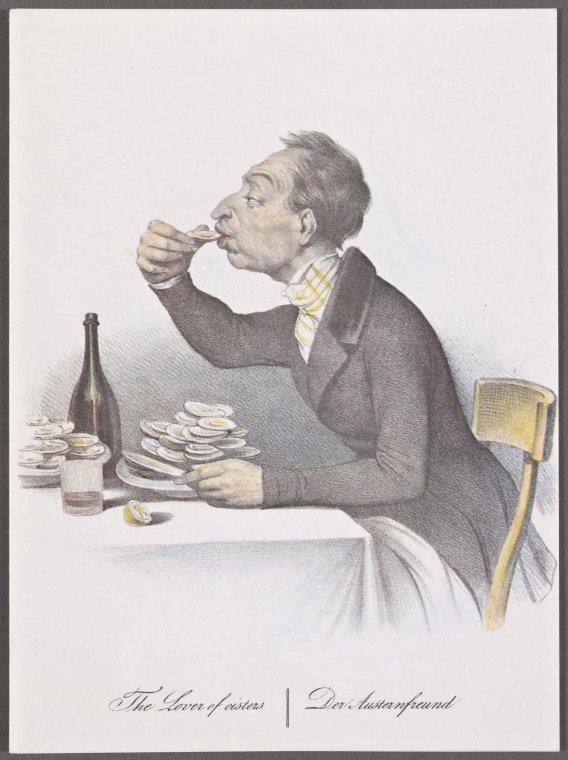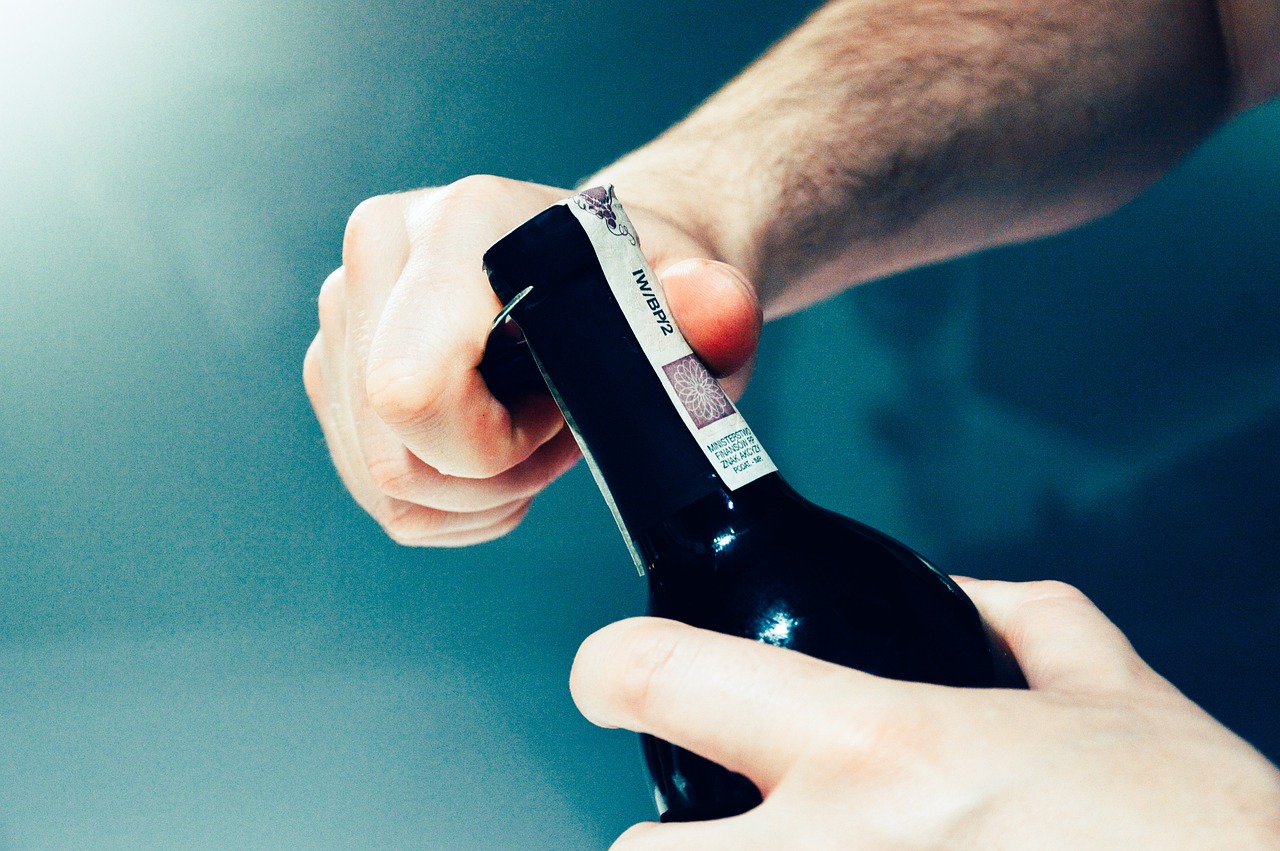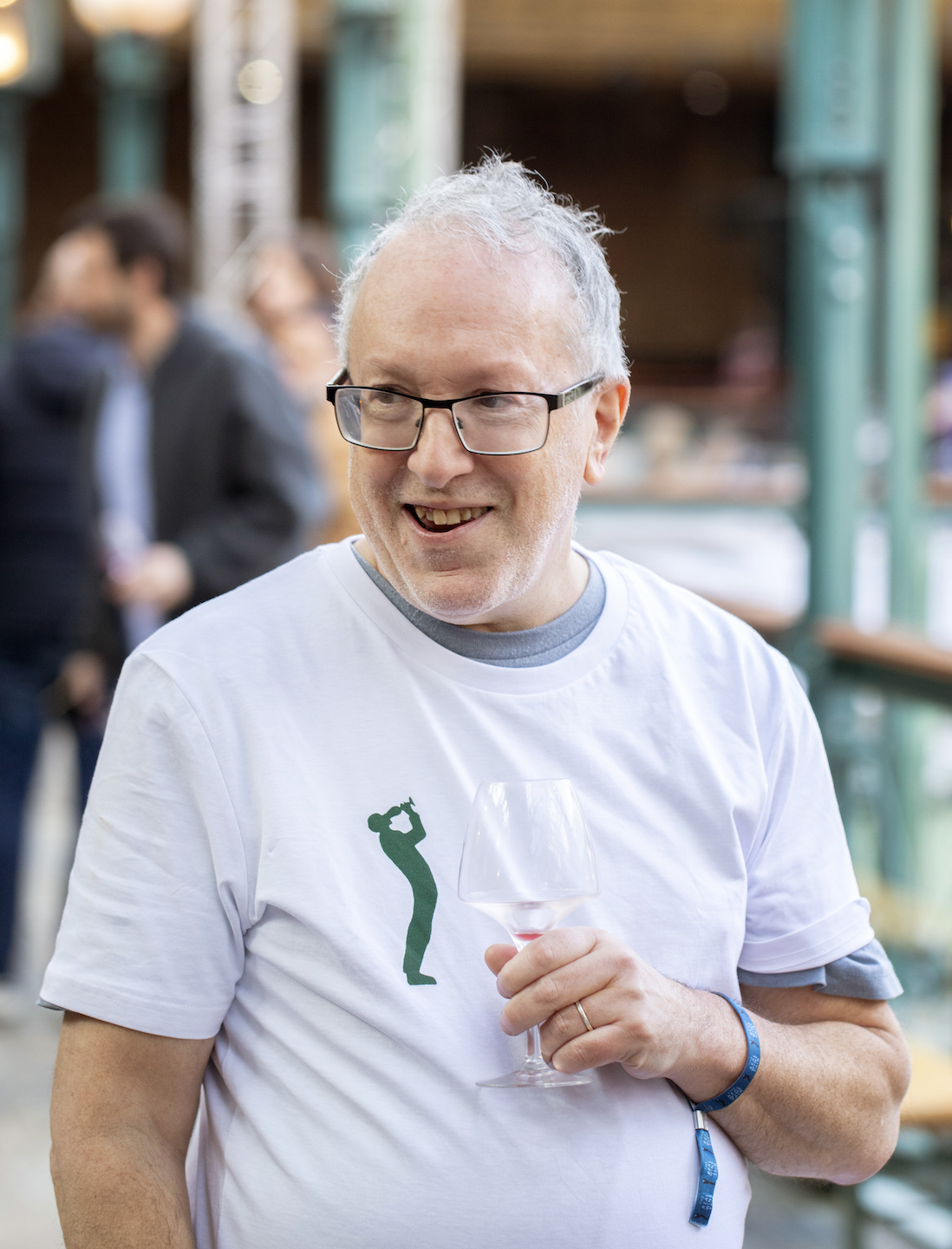
-Once upon a time we were able to put people on the moon, but we have never found a sensible solution for recycling and reusing glass wine bottles.
-Weather influences what you drink more than the recommendations of wine commentators or bloggers.
-The (over)use of technology in winemaking has resulted the exaltation of clinical mediocrity.
-Wine trends are 99% PRspiration and 1% winemaking INspiration.
-If any of these make it as memes, I will eat my hat (the one with corks dangling from it).
-It is seemingly more important that a wine vanity project succeeds because of blanket social media coverage than because it is inherently interesting.
-There is roughly 20p worth of wine in a bottle price of £5.50.
-When marked up in restaurants, that would mean that roughly 1% of your bottle of wine was down to the cost of the wine.
-You can create waves in the navel-gazing wine world by being (apparently) controversial for the hell of it.
– The more banal and quasi-provocative the meme, the more likes on Instagram.
-The word “sustainable” has become so over-used in the world of wine as to be effectively meaningless.
-Wine is treated by the media as an arcane discipline which is over-complicated and shrouded in pseudo-scientific jargon, the intellectual domaine of a select few. This has resulted in a new kind of wine infantilism, wherein the wine is made accessible by going to the opposite extreme and dumbing down the issues in favour of “sound gulps”.
-The majority of wine is made in factories dedicated to denaturing wine.
-Champagne has coasted on myth and bubble reputation for centuries. Because of this, top quality hand-crafted growers’ champagnes have been less appreciated than they deserve.
-The power of brands is the result of the human desire to conform to the perceived tastes of the majority and is the ultimate manifestation of our insecurity about wine.
-Virtually all wine surveys are pointless. And patronising, because they group individuals into behaviourist categories on the basis of age, gender and socioeconomic status.
– A bottle of limpid rosé is infinitely more desirable as a lifestyle accessory, especially when papped with background of a swimming pool or aquamarine ocean and for being consumed by buff young personages with improbably good dentistry.
-The average consumer is both a straw man and a caricature for much of the wine trade.
-The wine trade has managed to concoct a critical mumbo-jumbo which debases our language featuring and largely dependent on buzz-words-and-phrases such as gatekeeper, path to market, SKUs, revenue channels, premiumisation, inventory management, UPCs, EANs…Zzzs
-Globalisation has resulted in the exponential growth of social media conferences.
-Much winemaking avails itself of technological tools for the sake of using tools. This often results in pretentious wines as the more you have to use these tools, the less of the original wine you end up with.
-Enjoyment and pleasure are peculiarly absent from the language of wine criticism.
-Over-analysis of wine leads to emphatic over-banalysis.
-Having a obsessive parasocial relationship with a wine influencer is like shouting at a soap opera character on TV.
-Some critics seem philosophically incapable of understanding the difference between faults and flaws. Flaws are imperfections, the deviations from the norm, the rough surfaces that give individuality to the wines. Flaws are what give us our personalities. Most critics view flaws as faults and thus wine is invariably construed as no more than the sum total of these so-called faults.
-It is better not to grow vines and make wine than to pollute the environment with chemicals. It is better not to make wine than to sacrifice biodiversity for the sake of profit.
-Wine judging more often than not rewards the lesser of two evils – bland correctness triumphing over problematic interest. Consistency is the hobgoblin of foolish minds.
-The bigger the marketing budget, the blander the wine.
-The glossier/thicker the brochures, see above
-Heavy bottles=small man syndrome
-Expensive new barriques = *see above
-Expensive consultant=*see above
-Wine award shows are more for industry figures to pat each other on the backs than to truly try and determine the best wine (what IS best anyway?!).
-An astonishing number of wines are returned in restaurants and returned from restaurants to suppliers as “corked.” When they are, in fact, out of condition, often oxidised, sulphurous, or sporting a variety of faults – but not corked. Corked is not a blanket description for faulty wines.
-Mark-ups in restaurants bear zero relation (plus vat and service) to the value of the wine inside the bottle.
-It is more important for bean-counters to make a precise % profit margin on every bottle of wine than to have happy customers who desire to return to an establishment frequently because they can actually afford to drink decent wine there.
-The new wave of boutique wine producers talk a better game than they play.
-Trade mags are seemingly only interested only in:
*The Chinese market
*Record auction prices
*The incessant vanity projects of actors, rap artists, footballers
*Diageo & Pernod Ricard
*Pernod Ricard & Diageo
*Bordeaux, Boredeaux, By Now Totally Boredeaux
*Summits and conferences about either incredibly niche topics or the bleedin’ obvious.
-Natural wine might not exist as a perceived phenomenon if its critics did not ceaselessly fan the embers of controversy.
-The best bottle is the empty bottle – drunk by people who enjoy the taste of wine.
-The worst bottle is the empty bottle – emptied down the sink.
-(The use of) sulphur in winemaking is not the issue; too much sulphur should always be an issue.
-Most back labels on bottles are not worth the paper they are printed on.
-A lot of winemakers evidently think that opacity is a sign of quality, oak is a sign of seriousness and alcohol is a sign of virility.
-Many of the wine organisations that came into existence notionally to promote and protect standards end up as tax-and-spend bureaucracies, throttling individuality and stifling diversity.
-Many French regional interprofessional organisations are not noted for their imagination nor their sense of humour. Nor their support of their support of the efforts of small artisan producers.
-When dealing with difficult customers and perennially angry or self-important bloggers or tweeters do consult your biodynamic calendar. It may be a “nut day”.
-In the wine trade everyone knows each other’s business more than they know their own. And cherish their own opinions. Refer to Harry Callahan’s (played by Clint Eastwood) aperçu on opinions in The Dead Pool.
-Talking ad nauseam about great (expensive) bottles of wine you have drunk is no different to enumerating your sexual conquests.
-Oak is a container not the main flavouring agent in wine – so many winemakers are still into over-seasoning.
-People who claim that their barrels have a medium toast shouldn’t be allowed near a toaster.
-Thirty years ago only French wines displayed terroir and winemakers from other countries rubbished the term as typically Gallic mystical malarkey. Now every country’s wine industry proclaims that the wines grown there reflect… er… the region from which they originate.
-Food and wine matching is 50% common sense and 50% uncommon nonsense.
-Marketing your wine on the basis of its unique terroir is tautological. All terroir is surely unique; some terroir is simply better for vine-growing than others.
-Wine bloggers spend an inordinate amount of time praising other wine bloggers on social media in the hope that they will return the favour.
-Skin contact wine is not weird or revolutionary. All red wine is the result of skin contact.
-Ordering wine in expensive restaurants is playing Russian Roulette with your bank account.
-In the Loire the description Vin de France may be a badge of honour and a noble appellation in itself.
-Simplicity and complexity are not mutually exclusive qualities for a wine to possess.
The second lot of wine truisms may be true (or not), but they will never be as shockingly true (or false) as the first lot.
(Oscar Wilde – not)
-The best wine nourishes your body and soul.
–You write off some wines at your peril. Despite being considered dead or beyond redemption there are, indeed, zombie wines that apparently reanimate themselves and taste as if they are once more in the first flush of youth.
–That lava lamp is, in fact, a natural unfiltered wine from Mt Etna.
–Just because it is interesting that a certain country makes wine does not mean that the wine from that country is interesting.
–It seems that Virginia specialises in Viognier simply because all the letters bar o & a are contained within the other.
–A corkscrew loaned is a corkscrew you will never see again.
–Wax capsules were designed to annoy sommeliers. In this, they have succeeded.
–Wine appreciation is the ability to appreciate why some wines appreciate in value.
–The general consensus about the quality of a wine region is neither general nor a consensus.
–Mood and company immeasurably influence the taste of wine, but it goes both ways.
–Over-analytical tasters can detect reduction a wine at acutely low levels but are seemingly impervious to sulphur dioxide at very high concentrations.
–If you write positively about a wine that retails between £15 and £25 in a newspaper you must be prepared for the seven seas of correspondence complaining about your choosing to review a wine that is expensive and therefore, by definition, elitist. The entrance fee to see waxworks in Madame Tussauds is £22 and an adult match ticket to see Arsenal may be as much as £129, not that watching waxworks play football is an elitist pastime.
–Reverse snobbery about wine is equally as rebarbative as wine snobbery.
–BOGOF has successfully reduced wine to the status of a mere alcoholic product where price point is venerated at the expense of quality. It is also an example of the long marketing con that supermarkets play on their customers.
–Using cheap composite corks in expensive bottles is playing Russian roulette with a wine whilst at the same time slowly poisoning it.
–Good orange juice is invariably ruined by bad champagne.
–You never stop learning about wine, but that doesn’t stop some people.
–The wine trade needs closure on the stelvin debate.
-Discovering a wax capsule on a rosé wine should make one inordinately happy.
–People who have the temerity to write approvingly about their enjoyment of natural-tasting wines are caricatured as swivel-eyed loons and dizzy-headed, clay-brained yahoos by the rational HOUYHNHNMS of the wine cognoscenti (pejorative word).
–The language of wine treads a perilous tightrope between graphic and pretentious. It is easy to fall off that tightrope.
–According to some scientists and wine scribes gout-à-terroir is not only unverifiable but the result of collective mass hypnosis and a priori association even when the taster has no idea of the grape variety, region, topography or soil type.
–Believing in the common denominator of consumer taste causes many winemakers to aspire to mediocrity.
–Great wine service in restaurants is more about the friendly communication of knowledge than about the knowledge itself.
–Tell me how you taste, and I will tell you who you are. Tell me who you are, and I will tell how you taste. We inevitably bring our life experience to the process of tasting and enjoying wine.
–The MW accolade is a portal to further investigation and consequent expertise, not the gateway to omniscience and divine infallibility.
–The typical natural wine bar should be a humble establishment designed to make drinkers relax and have fun with wine.
–Taster’s twitch is not only contagious but should be throttled back for the well-being of the wine.
–A lot of people who call themselves natural make unnatural-tasting wines.
–Generic trade tastings have ceased to fulfil any meaningful function, but they do provide large rooms where members of the wine trade can gather together and update their Facebook/twitter status.
–It is far more important that high-end Californian wines succeed in their home market than that they fail in markets abroad.
–New World winemakers are occasionally overly obsessed with being judged better than their brethren in Bordeaux, Burgundy and the Rhone – as if being highly regarded by certain critics is the be-all-and-end-all of making wine. It is never a question of being thought better for the sake of it, but making wine with a singular identity that gives pleasure to those who drink it.
–You shouldn’t discriminate against which grapes wine is made from because wine doesn’t discriminate against who drinks it. (Apart from Muscadine because that grape hates you and you should hate it right back).
–Following on from that if you want to insult or diminish the status of a grape variety you may assert the following without fear of contradiction: “Wild Muscadine grapes are functionally dioecious due to incomplete stamen formation in female vines and incomplete pistil formation in male vines.”
–There is a dominant vein of tabloid-esque hyperbole in wine recommendations in national newspapers wherein the journalist displays a quite superb indifference to the overuse of superlatives.
–Following on from that any trumpeted recommendation which uses the word “best” in it deserves to be taken with a massive sack-load of sulphur.
–And following on from that how often can one region have its best vintage ever (since the last one)?
-Some of the greatest and most classic wines come from the trickiest vintages.
–Never overestimate the quality of a wine where a huge amount of thought has gone into the creation of a label.
–Never operate heavy machinery whilst pregnant and drinking a bottle of wine. Your doctor wouldn’t like it.
–Never trust a wine from a winemaker who says that they were a woodpecker or a termite in a previous incarnation.
–In the Panglossian world of Bordeaux all is for the best in the best of all possible financial worlds as the good vintages are pluperfect if you are an oligarch, and the bad vintages make up for it by still being barely affordable.
–Poor editorial work by magazine sub-editors often results in wine articles that read like a series of sweeping generalisations.
–The wine world would be a fantastically dull place without idealism, controversy, humility and humour. And sometimes is.
–The knowledge of certain restaurant critics about food is only matched by their ignorance of, or complete indifference to, wine.
–Drinkers May Be Divided Into Four Classes (with apologies to Samuel Taylor Coleridge):
*Sponges, who absorb all they drink, and return it nearly in the same state, only a little dirtied.
*Sand-glasses, who retain nothing, and are content to get through a bottle of wine for the sake of getting through the time.
*Strain-bags, who merely retain the dregs of what they drink.
*Mogul Diamonds, equally rare and valuable, who profit by what they drink, and enable others to profit by it also.
–If wine may be considered to be mutable and tastes different on different days what is the point of big wine competitions? For what is “the average taste” of that particular wine? But if the wine isn’t mutable, what is the point of the wine?
–Slavishly conventional winemaking is as much as a voodoo science as an empirical one.
–Try as one might it is very difficult for the average consumer to get remotely worked up about the fraudulent marketing and trade of fine wines.
–Winemakers like to have “missions”. Not be confused with Mission or Pais grapes which is what Chilean winegrowers from Maule like to have. It gives a whole new meaning to “raisins d’être” (sic).
–There is a widespread belief that without the constant oxygen of media exposure, self-publicity and marketing self-reinvention the entire commercial viability would be jeopardised.
“Facts are stubborn, but statistics are more pliable, and prejudice is a great time saver as you can form opinions without having to get the facts.” Pillars of wine trade wisdom.
–When a producer says that they are very pleased with a vintage, it means that they are delighted that they made any wine at all.
–AOC is not, and has never been, AOK. Besides it is now AOP which just illustrates that nothing is forever.
–Price comparison websites have discovered that supermarkets artificially inflate wine prices before slashing them in order to give the appearance of a bargain. This news is as shocking as the fact that, apparently, the earth also goes round the sun.
–“Champagne’s innovative marketing strategies, with its links to fashion, luxury and celebrities, are helping to build a high-end image in China and attract more consumers”. Please pick out in bold the many objectionable terms in this sentence.
–Boutique has become a marketing term denoting a cult wine that commands beastly prices.
–Garage wine used to be a description of a wine made in a garage. Now it refers to a wealthy chateau that has a garage big enough to house a fleet of Daimlers.
–Opposing wine grape varieties in a metaphorical beauty contest or arm-wrestle is a monumentally pointless activity. Chardonnay versus Gruner Veltliner, Pinot Noir versus Cabernet Sauvignon and so forth. Far better to oppose soil types: limestone versus clay, schist versus granite, gneiss versus orthogneiss, eisen versus blut, dumb versus dumber…
–If sweet wines are the greatest expression of the winemaker’s art why do so few people drink them?
–When a wine becomes trendy it acquires an initial veneer of sophistication. Take sherry. It took ages for the UK wine trade to be impressed by and recognise the potential quality and versatility of this wine. Yet so much sherry that is imported into this market is strip-filtered and cleaned up to the point of being anodyne. But trends always reflect the attitude towards the idea of something rather than the actualité.
–The best wine in a restaurant is often not on the list.
–“The New…” is the classic rehashing of the insert grape/region/style/wine colour and, like any novelty, is as old as the world itself.
–The wine trade understands and embraces the concept of mutability when it relates to the value of Bordeaux and Burgundy vintages but fails to appreciate variability in wines from less exalted regions.
Wine Truisms: Part 3
–There is a trend to highlight countries that have been making wine for several millennia and branding them “interesting new wine territories”, for the simple reason that a few key commentators have just discovered that they make good wine.
–Oenologists enjoy making money-filled silk purses out of the sows’ ears of mediocre terroirs.
–Journalists’ wine recommendations tend to be complemented by sub editors’ alliterative straplines so we can better remember what they are.
–Some wine writers are infected by overwrought “Clarksonitis” resulting in hyperbolic hyperventilating and magniloquent metaphor-mangling.
-There is a vogue for tasting notes that conjure a Goblin Market of exotic (and perhaps fictitious) fruits and juxtapose them with myriad other abstruse flavour profiles.
–“Highly drinkable” is one of the classic euphemisms of the wine trade, whilst “drinkable” actually means the polar opposite.
–A trip to a beautiful, sunny country or wine region where one experiences the best of the best of excellent hospitality inevitably lubricates one’s appreciation of the wine scene within that country or region.
–Reference to minerals, mineral flavours and minerality annoys a certain ratio of scientists who posit that those who believe in its tangible presence are truly “stoned” themselves.
–There is a generation of wine drinkers unable to come to terms with amber-coloured wines and, henceforth, regard them as unnatural (but equally seem to have no difficulty with impenetrably dark, treacle-thick wines which are the vinous equivalent of black holes).
–Some wine critics seem to believe that orange (skin contact) wine is akin to reinventing the wheel. Since that wheel has been constantly turning for hundreds – and even thousands – of years, it could equally be argued that non skin-contact wines are just a blip in wine history.
–Natural winemaking is not doing nothing; it is about replacing chemical intervention with physical effort, personal judgement and perpetual vigilance.
–Although there is no universally agreed charter for natural winemaking it seems that certain critics have developed one out of their imaginations and made it into a voodoo doll which embodies every wine fault under the sun.
–The wine world is obsessed with best in show: eg World’s Best Cabernet. Every day, somewhere on this planet, a panel of people is judging wines. This circumstance might conceivably lead us toward J.M Keynes’ ideal of universal full employment, were it not for the fact that the judges tend to comprise a small coterie of men and women who move swiftly from city to city and country to country like circuit judges or hired gunslingers.
-There will soon be so many days dedicated to individual grapes that a new calendar will have to be written simply to accommodate all the Georgian vareities.
–Thanksgiving and Christmas wine recommendations are often the real turkeys on the table.
–The appearance of the phrase operating profit uplift in wine trade magazines is ample reason to close them down.
–The Loire Valley should be classified as an endangered habitat, be moved into the Eden Project, and protected against the depredations of Nature.
–Dan Brown was going to write a novel about the clandestine pricing shenanigans of supermarkets but found that such a story of arrant manipulation and devious machinations would stretch the reader’s credulity beyond breaking point.
–Wine companies that believe that they should “buy” gross turnover with gifts, subsidies and payments do not have a credible business policy.
–It is easier to enjoy a terrible wine than a mediocre one. “I rather like bad wine … one gets so bored with good wine.” (Mr Mountchesney – Sybil by Disraeli). Following on from this, the ubiquity of mediocre or barely palatable wine should be celebrated for giving us a “beige standard” by which all wines may be measured.
–“Some scientists claim that hydrogen, because it is so plentiful, is the basic building block of the universe. I dispute that. I say there is more stupidity than hydrogen, and that is the basic building block of the universe.” (Frank Zappa) French wine bureaucracy is founded on these very building blocks of the universe.
–Some restaurateurs treat wine merchants like the bank they wish they had.
–The more sophisticated the till and stock system in a restaurant the less flexible its wine service.
–The person with the best palate in the wine trade is the one who agrees with you.
–Natural wine is the monomaniacal fixation of a small group of growers and a tiny trendy commentariat. The argument in a nutshell? “Without standards there can be no structure, without structure no hierarchy, without hierarchy no defined sense of right and wrong – the natural wine movement seeks to undermine all our cherished certainties – from industrial methods of farming and the freedom to use chemicals to make wine, to hijacking and distorting the very language that we use. You cannot affect moral superiority in all these areas when the only belief you truly espouse is the right to make vinegar.”
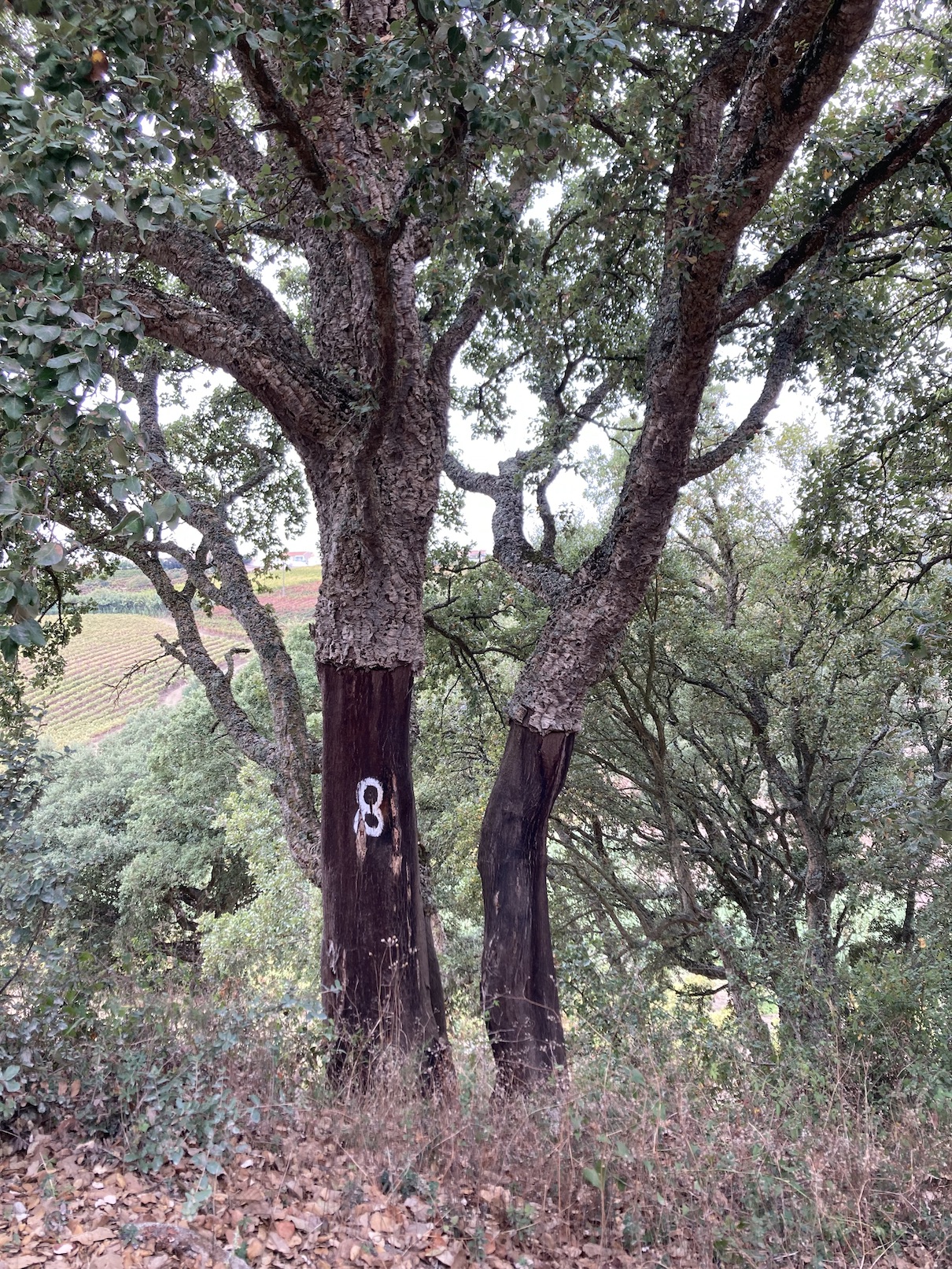
–The Unbelievable Truth about Corks:
SIR, The correct term for a wine that is not as it should be is corky, not corked, which simply means that a bottle has a cork in it. When a cork has tainted a wine, making the wine smell and taste off, it can be due to the cork weevil infecting the cork and making it become slightly crumbly.
But fine vintage wines can also have an unpleasant aroma when first opened; people can think that the wine is off or it has passed its best, but this smell soon passes, revealing the wine’s true pedigree.
A lot may be revealed by the humble cork, and it’s worth inspecting before tasting the wine. The shape of the cork, the degree of staining and the colour of the stain can reveal the wine’s age in red wines. Crystals on the bottom of the cork are an indication that the wine has not been well cared for. –Ian Burrows, Brighton, East Sussex
Take a bow, Mr Burrows. The wine trade is now finally fully in possession of the facts about the humble cork.
–There is an unlimited appetite for food programmes on TV but also little thirst for equivalent wine programmes. Food pornography works because we all have a personal intimate relationship with food, whereas wine is treated like a baffling alien product. As a result the few wine programmes that are made tend to be facile or condescending – or both. To be fair wine is ill-served throughout the traditional media, and few publishers have the wherewithal (or inclination) to commission thought-provoking or informative wine books.
–Malbec simply isn’t an interesting enough grape to hang the whole of a country’s wine culture on.
–Deep discounting devalues wine in every sense.
–In an ideal world Just In Time (JIT) stock control systems would work. We don’t live in an ideal world.
–Sherry producers don’t have a word for mañana as they cannot comprehend the urgency of such a concept.
–Matching sweet wines to sweet desserts may be seen as over-sugaring the pudding. Would you throw a perfume on a violet? No, though you might throw a sherry on a trifle.
–A rarely-glimpsed grape variety, if made with flavoured yeasts, a cold ferment, stabilising agents and full filtration, isn’t worth the detour.
–Terroir is a heck of a lot more than the fact that different vines have their feet in different soils.
-Humans are an integral part of the wine’s terroir.
–Oenologists sometimes believe that they are enhancing terroir flavours. This is an oxymoronic notion.
–It may be surprising, but it can be just as wonderful to taste a fresh balanced wine at 15% as it is a fully ripe wine at 11%.
–Wine writers, by trade and by inclination, are listafarians.
–A big brand wine-tasting is like a dog standing on its hind legs; tis not that it is done well, tis that it is done at all… – pace Samuel Johnson
–Poorly acidified wines are the sweet-‘n’-sour-pork-from-your-local down-at-heel-takeaway of the wine world.
–So much dosage in champagne tastes like over-compensation.
–“Cool harvest” on a bottle denotes that white grapes are being grown in an unfeasibly warm climate and therefore have to be harvested in the middle of the night with a fleet of refrigerated tricks standing by.
–Wine merchants secretly envy retailers (& sommeliers) because they have a captive audience.
–If there were not daily stories about the overheating Chinese Wine Market, trade magazines would undergo their own China Syndrome meltdown and would have to fill their yawning pages with a farrago of tattle about brands, auctions and en primeur ups-and-downs.
–White wine is as mythical as the unicorn. When did you ever see a wine that was truly white?
–Mass produced wines are made by keeping the price down artificially by ploughing a massive amount of money into moderate-to-low concept, flash labelling and marketing subsidy lending corroborative gloss to bland, industrially-made products.
–Having Red, Yellow, Silver and Gold labels on your bottles may be a good idea –for grading quality levels of vinegar.
–Wine documentaries seem to prove that people enjoy behaving like parodies of themselves, and given sufficient rope, will hang themselves out to dry a hundred times over.
–For technical winemakers absence of faults is an excellence to be prized over intangibles as soul, energy and singularity.
–If Jimi Hendrix made wine he would be an unalloyed natural winemaker and wouldn’t care about having cacophonous feedback.
–5.99 Pinot Grigio is the (barely) vinous equivalent of muzak.
–There seems to a small, reductive academic industry engaged in describing the “philosophy of Taste.” Rather than admitting that describing taste is like trying to nail jelly to a wall, these academics posit a perfectly explicable universe where the wine itself is the mere concatenation of numerous microbiological processes, whilst taste is a neuropsychological phenomenon, the result of inevitable neuro-electrical stimuli. This absolute appliance of science compels you to accept the overriding immutability of such natural laws and so we might as well ditch any notion of personal aesthetics, sense of wonder and enchantment, and, as for pleasurable response, that must be the wine talking… oh sorry, wine can’t talk!
–If in doubt, plant vines near a volcano.
–Fermenting in ceramic or cement eggs is no joke.
–Riddling truisms – if you taste but one exceptional wine from a region, does that mean that the region has the potential to make exceptional wines, or that exceptionally able, driven growers and winemakers can make exceptional wines in any region?
–No Caesar of Salad, No Chevalier of Cheese or No Burgrave of Beer but Master of Wine. Discuss.
-Syzygy is the perfect alignment of cork, wine glass and bottle in an Instagram photograph.
-“Never knowingly underhyped” should be the slogan for the modern English wine industry.
-The word reserve in Alsace means bog-standard cuvée.
-Red wine is still served far too warm in restaurants, bars and pubs. Alas.
-Never judge a wine by its label.


